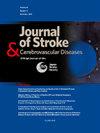儿童在促进跨代中风扫盲中的作用:FAST英雄倡议的叙述性回顾
IF 1.8
4区 医学
Q3 NEUROSCIENCES
Journal of Stroke & Cerebrovascular Diseases
Pub Date : 2025-07-23
DOI:10.1016/j.jstrokecerebrovasdis.2025.108404
引用次数: 0
摘要
背景,目的强调儿童可以作为有效的信使,帮助提高他们的父母、祖父母和更广泛的社区的意识。依靠这一方法,FAST英雄项目让儿童成为知识转移的核心代理人,旨在提高他们家庭中的中风知识。本综述的目的是研究儿童如何获得中风相关知识并随后促进其向家庭转移。观察研究表明,参加该项目的孩子的家庭成员能够识别常见的中风症状,并在怀疑中风的情况下展示适当的行动方案。FAST英雄项目通过整合一些基于证据的教育原则,如互动和多感官学习,有效地吸引了儿童。此外,该计划遵循渐进和结构化的方法,促进知识获取和长期保留。fast Heroes关注代际学习,创造一个有效的学习环境,提高代际中风知识的读写能力。随着该项目在全球范围内的不断发展和扩展,它为中风教育提供了一种可持续的方法,展示了精心设计的健康素养干预措施的持久影响。本文章由计算机程序翻译,如有差异,请以英文原文为准。
The role of children in promoting stroke literacy across generations: A narrative review of the FAST Heroes initiative
Background & Purpose
It has been highlighted that children can serve as effective messengers, helping to raise awareness to their parents, grandparents, and the broader community. Relying on this approach, the FAST Heroes program engages children as central agents of knowledge transfer, aiming to enhance stroke literacy among their families. The purpose of this review is to examine how children acquire stroke-related knowledge and subsequently facilitate its transfer to their families.
Observations
Studies have shown that family members whose children have participated in the program were able to identify common stroke symptoms and demonstrate the appropriate course of action in case of a suspected stroke. The FAST Heroes program effectively engaged children by integrating several evidence-based educational principles, such as interactive and multisensory learning. Alongside, the program follows a progressive and structured approach that facilitates knowledge acquisition and long-term retention.
Conclusions
FAST Heroes focus on intergenerational learning, creating an effective learning environment that enhances stroke literacy across generations. As the program continues to evolve and expand globally, it offers a sustainable approach to stroke education, demonstrating the lasting impact of well-designed health literacy interventions.
求助全文
通过发布文献求助,成功后即可免费获取论文全文。
去求助
来源期刊

Journal of Stroke & Cerebrovascular Diseases
Medicine-Surgery
CiteScore
5.00
自引率
4.00%
发文量
583
审稿时长
62 days
期刊介绍:
The Journal of Stroke & Cerebrovascular Diseases publishes original papers on basic and clinical science related to the fields of stroke and cerebrovascular diseases. The Journal also features review articles, controversies, methods and technical notes, selected case reports and other original articles of special nature. Its editorial mission is to focus on prevention and repair of cerebrovascular disease. Clinical papers emphasize medical and surgical aspects of stroke, clinical trials and design, epidemiology, stroke care delivery systems and outcomes, imaging sciences and rehabilitation of stroke. The Journal will be of special interest to specialists involved in caring for patients with cerebrovascular disease, including neurologists, neurosurgeons and cardiologists.
 求助内容:
求助内容: 应助结果提醒方式:
应助结果提醒方式:


